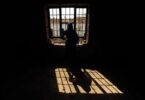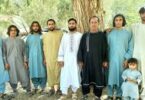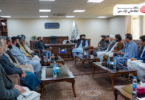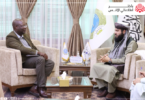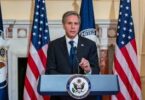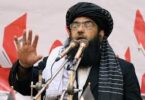Monitoring Desk
KABUL: Terming peace as the basic demand and need of the Afghan people, Chief Executive Officer Dr Abdullah Abdullah said on Sunday that making peace with the armed opponents was not tantamount to disrespecting the rights, achievements and norms of people.
Addressing a gathering held by the Wolesi Jirga’s commission on women, civil societies and human rights in Kabul, Dr Abdullah said the rights of citizens have been established as a result of sacrifices and efforts of the Afghan people. No one had the right to make a deal on this issue, he observed. He went on to say that the peace process did not provide opportunity for anyone to impose the 16-year old ideology on the Afghan people once again.
The government was determined for peace talks, he said, adding that their doors were open for all those people who want to quit violence and extend hands for peaceful political process. The government has not set any pre-conditions in this regard, he added.
The Afghan forces were defending the independence of country, dignity of people, territorial integrity, Islamic republic and united Afghanistan against the menace of terrorism, he said. Justice, balance and development were the legal rights of people, he added.
Efforts, determination and sacrifices were needed for the restoration of peace, he said. The government was also the owner of these entities. However, the achievements and rights of people would not be put at stake.
Stressing on justice and respectable peace, Dr Abdullah said the people quitting violence and adopting the path of peace should not be treated with hate and disrespect.
They should not be deprived of the rights guaranteed in the basic constitution, he observed.
If the armed opponents demanded opening of a political office for peace in Kabul, he said no hurdle would be created in their path.
The idea of a political office for Taliban in Kabul immediately came to the limelight, he said. However, the situation was not favorable for this purpose.
Dr Abdullah said violence against women was still a major challenge.
No changes have occurred in the mindset of the society in this regard so far.
Basic changes have occurred in the situation, activities and protection of rights of women, he said, adding that the circumstances have changed compared to the past 16 years. However, violence against women was still a serious concern for the government, he added.
He said the presence of women in various government and non-governmental organizations, their widespread activities and the actions for demands were the basic changes in the situation.
Religious clerics, civil societies, people and government could play basic role to stop violence against women, he said. However, violence against women was still a major problem, he added.
He lauded the international community for paving the way for women besides supporting the Afghan government.
“Lot of work is required to enlighten the common thinking. I promise that the government would take basic steps in this regard. However, I demand the media, civil societies, religious clerics and people to take steps in this regard and stop violence,” he said.
Talking of the national reconciliation programme, he said attention has been paid on the situation of women in the project. Its complete implementation would put positive impacts on people besides paving the way for people to work for their livelihood. Their priorities would be given top priorities, he maintained.
Limitations still existed against women in the country, Dr Abdullah said. Comparative facilities still persisted in provinces, Kabul and mega cities, he added. The participation of women in the provinces is still limited up to the women affairs ministry and departments.
Dr Abdullah directed the Independent Directorate of Local Governance to pay priority to appointment of women as deputy governors, mayors and in other departments. He assured that political issues would not be sacrificed for women development.
Head of Wolesi Jirga’s commission on women, civil society and human rights, Fauzia Kofi, deputy chairman of Independent Directorate of Local Governance Abdul Malik Siddiqui and deputy minister for women affairs Spogmay Wardak also addressed the gathering.

